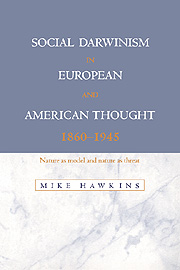Postscript: Social Darwinism old and new: the case of sociobiology
Published online by Cambridge University Press: 07 December 2009
Summary
Introduction
There is a widely held view among historians and social scientists that Social Darwinism declined in popularity after World War II due to its association with racism and Nazism. The belief is that in the post-war democratic consensus that emerged in the Western states there was little tolerance for theories which apparently gave a biological justification for racism, war or exploitation. The American historian Degler considers these circumstances were not just uncongenial for Social Darwinism but actually fatal to it. ‘Social Darwinism’, he writes, ‘was definitely killed, not merely scotched …’
The thesis that Social Darwinism is dead is false, as will be shown below. The weaker claim that it declined in importance during the immediate post-war period is plausible although the detailed studies required to substantiate it have yet to be made. In any case, by the mid- 1960s Social Darwinism had re-emerged and was reaching wide audiences in Britain and the USA. It took the form of popular writings about the evolutionary heritage of humans that were the forerunners of sociobiology which itself, I shall argue, is a particularly powerful example of Social Darwinism. It is possible that Social Darwinism was manifested in other currents of thought in the post-war era, and that accounts of its decline have been exaggerated, but an investigation of this possibility is outside the scope of this study.
- Type
- Chapter
- Information
- Social Darwinism in European and American Thought, 1860–1945Nature as Model and Nature as Threat, pp. 292 - 313Publisher: Cambridge University PressPrint publication year: 1997



